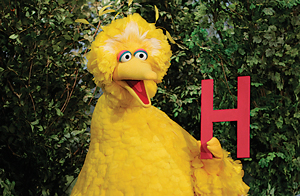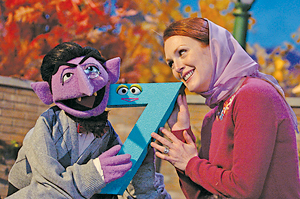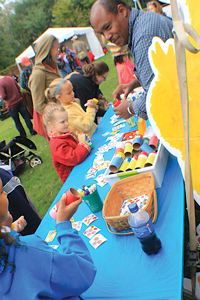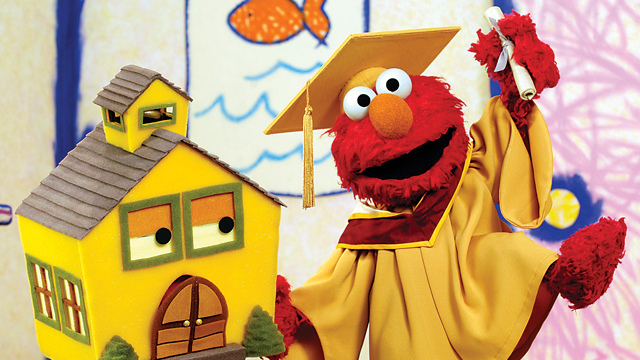Bina Shah is a mom, a real estate agent, a member of the India Association, and a supporter of the Community Idea Stations. When she came to America with her husband and young daughter more than three decades ago, she couldn’t speak English.
Today – in perfect English – Bina proudly says, “I watched PBS with my children and we learned a lot. When I came to this country, my sister said ‘Bina, watch Sesame Street and Mr. Rogers. It’s a great way to learn English.’ And she was right!”
 The Shah family isn’t alone. They are like many others who have learned to read and speak English by watching Sesame Street and other PBS programs. Each week, more than twenty different children’s programs are broadcast into homes, schools, and a variety of other places through media provided by the Community Idea Stations. Every program is created to meet specific curriculum objectives and is extensively tested to ensure that its impact is maximized.
The Shah family isn’t alone. They are like many others who have learned to read and speak English by watching Sesame Street and other PBS programs. Each week, more than twenty different children’s programs are broadcast into homes, schools, and a variety of other places through media provided by the Community Idea Stations. Every program is created to meet specific curriculum objectives and is extensively tested to ensure that its impact is maximized.
“People think that PBS KIDS shows are cartoons like any other channel on the dial,” says Ready To Learn Coordinator Mary Jo Grieve, “but they are not. A program like Sesame Street teaches literacy and social, emotional, and healthy living skills while programs like Curious George, Cat and the Hat, Odd Squad, and Wild Kratts teach science, technology, engineering, and math skills.”
 For many children, PBS KIDS is a primary source to learn vocabulary, numbers, and other skills needed to give them an opportunity to keep up and succeed when they find themselves facing the new challenges that kindergarten presents. Grieve notes that the Community Idea Stations devotes more than 120 hours a week to PBS KIDS programs aimed at helping families prepare their young children for success in school.
For many children, PBS KIDS is a primary source to learn vocabulary, numbers, and other skills needed to give them an opportunity to keep up and succeed when they find themselves facing the new challenges that kindergarten presents. Grieve notes that the Community Idea Stations devotes more than 120 hours a week to PBS KIDS programs aimed at helping families prepare their young children for success in school.
In addition to the extensive commitment to children’s education, the nonprofit organization promotes life-long learning by providing programs that appeal to all ages. “Our mission is to use the power of media to educate, entertain, and inspire,” says Curtis Monk, president and CEO, “and we take pride in providing an array of local, national, and international programs that deal with a variety of subjects including science, news, history, and the arts.”
The organization was founded over fifty years ago when a group of seventy-nine community leaders came together to create a television station that first was launched as WCVE Channel 23 to support teachers in the classroom. Soon after that, WCVE became a charter member of PBS. Over time, the company has expanded by adding a second Richmond television channel, a television channel in Charlottesville, and three public radio channels.
Today, Monk says the Community Idea Stations is one of the largest and most influential nonprofit organizations in Central Virginia. Hundreds of thousands of viewers and listeners are impacted by the programming on a weekly basis. “We’re certainly pleased to be able to provide great programs from PBS and NPR, but we’re also mindful of the importance of producing local programs and hosting or participating in community events,” Monk says.
 Lisa Tate, vice president of development and marketing for the Community Idea Stations, talks with enthusiasm about the many activities that families and lifelong learners will experience. “Just this year, there will be local productions and events about Virginia politics, Quill Theatre’s Hamlet, Dissecting Science: Your Amazing Brain, Explore the Outdoors with Curious George, and the Downton Abbey preview celebration at the Altria Theater.” Tate issues an open invitation to people of all ages to watch, listen, and connect with the Community Idea Stations. “You can stay in touch with us by following WCVE or Ready-to-Learn on Facebook, or simply by visiting ideastations.org on the web. You’ll find lots of interesting things including our program schedules, Science Matters information, event information, and our radio streaming service.”
Lisa Tate, vice president of development and marketing for the Community Idea Stations, talks with enthusiasm about the many activities that families and lifelong learners will experience. “Just this year, there will be local productions and events about Virginia politics, Quill Theatre’s Hamlet, Dissecting Science: Your Amazing Brain, Explore the Outdoors with Curious George, and the Downton Abbey preview celebration at the Altria Theater.” Tate issues an open invitation to people of all ages to watch, listen, and connect with the Community Idea Stations. “You can stay in touch with us by following WCVE or Ready-to-Learn on Facebook, or simply by visiting ideastations.org on the web. You’ll find lots of interesting things including our program schedules, Science Matters information, event information, and our radio streaming service.”
Nearly 85 percent of all funding for the Community Idea Stations comes from the community and most from individuals who enjoy and appreciate the programming. Only about 15 percent comes from the federal government and none from the state government.
“If your family benefits from the Community Ideas Stations’ programming,” Tate adds, “we would be pleased if you would consider making a donation because you really do make all that we do possible.”

Photos: PBS KIDS, Community Idea Stations




